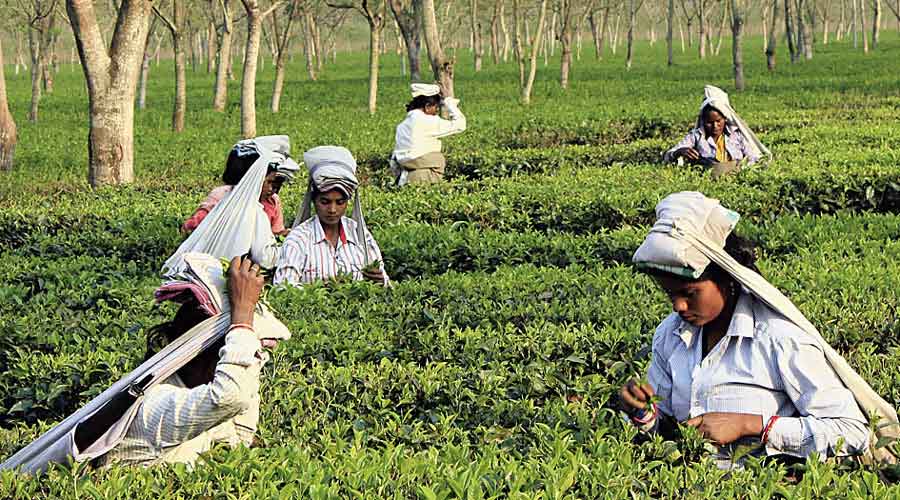The Tatas have been dragged into a snowballing controversy over an unchecked flood of Nepal tea imports into the country.
The Rs 7,287-crore Tata Consumer Products Ltd (TCPL, formerly Tata Tea) has been accused of using Nepal blends in their packet teas without proper labelling.
The company, which has a registered office on Bishop Lefroy Road in Calcutta, has said it does not directly import any tea from Nepal but admits it blends a ‘small quantity’ to provide ‘specific characteristics’ that are not available in India.
Many in the tea industry believe the accusation against the Tatas has whipped up an unnecessary tempest in a teapot that diverts attention from the problem over unfettered imports of Nepal tea into the region — which is the main issue highlighted in a public interest litigation filed by a body of Bengal-based tea planters and an owner of a Darjeeling tea estate in the Calcutta high court.
The PIL does not mention TCPL at all. Nor is it a party to the case that came up for hearing earlier this month before a bench headed by acting chief justice Rajesh Bindal.
The Central Board of Indirect Taxes & Customs, Tea Board of India and Food Safety & Standards Authority of India (FSSAI) have been named as respondents in the case, among others. The court has asked the respondents to file their replies before the next hearing in November.
Fear of fallout
Darjeeling tea industry doyens are peeved by the accusations against the Tatas and the disastrous fallout that this might have on the gardens in the region.
“A section of tea traders have been trying to pass off Nepal tea as Darjeeling tea — and that is a serious problem, not the Tatas. They are a big buyer of our tea and support Darjeeling gardens,” said Anshuman Kanoria, owner of Jungpana and Goomtee tea estates.
The Tatas purchase up to 1 million of kg of Darjeeling tea every year. The industry is upset that the sideshow in the entire controversy that has engulfed the Tatas will persuade them to stop all procurement of Darjeeling and Nepal teas in the region which would strain the balance sheets of the 87 gardens in Darjeeling.
Industry participants say the gardens in lower altitudes depend on big packeteers like the Tatas and Unilever to sell their monsoon flush teas which find few buyers abroad.
Darjeeling planters, battered by a triple whammy of declining yields, rising costs and tepid prices, can ill afford to antagonise a big, steady buyer.
“Any move by TCPL to reduce Darjeeling procurement would spell disaster for an already struggling industry,” Kanoria argued.
The whistleblower
The accusation against the Tatas have been whispered within the industry for a while but it burst into the open after Shanti Chhetri, a Rajya Sabha MP from Trinamul Congress and a three-time MLA from the hills, wrote a letter to Prime Minister Narendra Modi and Union commerce minister Piyush Goyal in which she complained about how imported teas from Nepal were hurting the fortunes of the Darjeeling tea industry.
In her letter, Chhetri said TCPL was blending Nepal tea in their popular brand Tata Gold without mentioning the country of origin of such teas, the name and address of the importer, and the premises where the tea was packed.
Chhetri claimed that a specific complaint had been made to the Tea Board but no action had been taken so far.
That complaint to the Tea Board was levelled by Sanjay Choudhry, director of Ringtong tea estate, who is a co-applicant in the court case.
Choudhry does not believe that the charge against the Tatas should be swept under the carpet.
“All I am saying is that the Tatas should disclose the origin of the tea on the pack. If it is blending Nepal tea, it should be mentioned,” said Chaudhury.
He stressed that there should be stringent quality control on the import of Nepal tea which often fails to meet the health and safety standards of FSSAI.
Moreover, the seller must disclose the origin of the tea at each stage of distribution as per Tea Board circulars.
Chhetri’s letter mentioned — and Chaudhury corroborated — that the Tatas have stopped buying tea from his garden in retaliation against his whistleblower act.
Tata response
TCPL officials told this newspaper that the company was compliant with all applicable FSSAI regulations.
“All tea procurement for our India brands is only from tea traded in the India domestic market which meet FSSAI regulations. This could include a small amount of tea produced in Nepal and available in the local market as per government regulations. This tea is available to and purchased by a cross section of buyers and packers in the country, including Tata Consumer Products, for whom such tea, in total, constitute less than 1 per cent of our total procurement for the India domestic market. These small volumes, if used, are typically procured to provide specific characteristics that are not available domestically,” TCPL said in its response to a questionnaire.
The company, which also owns gardens in Assam and south India through associate companies, went on to add that it was among the largest buyers of teas in India.
It ranks among the largest buyers from key tea centres such as Darjeeling, Siliguri, Guwahati, Calcuta, Coonoor, Cochin and Coimbatore.
“The company is a strong supporter of the India tea industry and, for almost two decades, has chosen to be the single largest buyer from Darjeeling. Tata Consumer produces over 160 million kg of India’s finest blends of tea, utilising a variety of teas, all of which meet existing FSSAI regulations and standards, and all our blends are subjected to our own stringent quality standards,” the company said.
Bijoy Gopal Chakraborty, who heads an association of smaller tea growers, lent his support to Choudhury. “Tatas are buying large quantity from Nepal at a lower cost than what bought leaf factories can offer. We are suffering,” he said.











